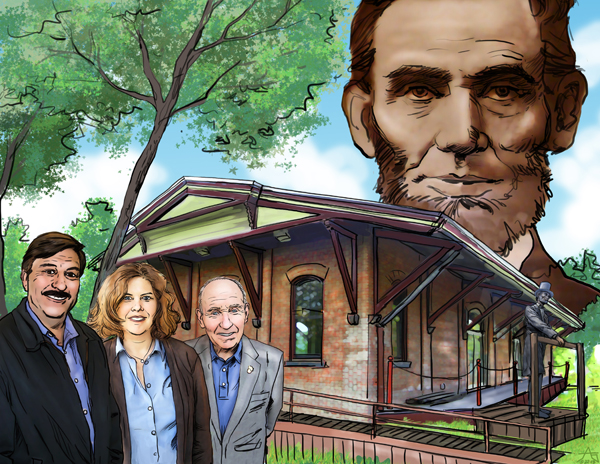“I will say in a single sentence, in regard to the difficulties that lie before me and our beloved country, that if I can only be as generously and unanimously sustained as the demonstration I have witnessed indicate I shall be, I shall not fail; but without your sustaining hands I am sure that neither I nor any other man can hope to surmount these difficulties. I trust in the course I shall pursue I shall be sustained not only by the party that elected me, but by the patriotic people of the whole country.”
”“ Abraham Lincoln,
Peekskill, Feb. 19, 1861.
“He gave pretty much the same speech at every stop,” John G. Testa tells us inside the old train depot being restored to new use on Peekskill”™s South Water Street, also known as Abraham Lincoln Way.
But those other whistle stops have not sustained the collective memory and the brick-and-mortar sites of Lincoln”™s four-sentence address ”“ the man knew how to write a long sentence ”“ as Peekskill has. The city on the Hudson was the president-elect”™s only stop in Westchester County on the long journey by rail from his home in Springfield, Ill., to his inauguration in Washington, D.C.
“Besides the Springfield station, this is the only other station that survived from Lincoln”™s trip,” says Testa, who has taken a midday leave from his teaching job at Peekskill High School to meet us at the Lincoln Depot Museum, a civic work in progress on Abraham Lincoln Way.
You will find it tucked away behind the massive Homestyle Desserts Bakery and the busy lumber yard of N. Dain”™s Sons Co. on the east side of the Metro-North Railroad tracks. The Dain family had been doing business on the Peekskill riverfront for more than a decade when Lincoln mounted a baggage cart to address its patriotic people ”“ and never mind that the city”™s election tally had not gone in his favor that past November.
Lincoln apparently was willing to do a favor for a colleague from his two-year stint in Congress, Peekskill attorney William Nelson. It was Nelson who invited him to stop there on his journey.
Testa is of the party that elected Lincoln, a veteran of the partisan battles that these days rage in White Plains as a Republican county legislator. But his volunteer work as president of the 7-year-old Lincoln Depot Foundation transcends his work as a politician, though that is where it began.
Testa was mayor of Peekskill from 2002 to 2007, when Republicans were in their glory in New York in the gubernatorial reign of Peekskill”™s former mayor, George Pataki. For about a century, Peekskill”™s Lincoln Society had annually commemorated his historic stop from a bluff that overlooked the privately owned former depot.
Its owner ran a heating and air conditioning business and on the property sat Quonset huts ”“ of World War II rather than Civil War vintage ”“ and an assemblage of road-weary trucks. “He used this as his workshop,” Testa says inside the brick depot being transformed as a digitally wired, glass-paneled contemporary museum of Lincoln-era and Civil War artifacts and exhibits. “He would do his sheet metal work here.”
Under Mayor Testa, the city secured a grant and in 2004 purchased the property for about $350,000. The city relocated the seller”™s HVAC business.
“We didn”™t use any city funds for it,” says Testa.
“That was a long struggle, getting the property,” says Patrick Garvey, chairman of the Lincoln Depot Foundation board. A former Peekskill city manager in the late ”™90s and a general in the Marine Corps Reserve, Garvey”™s long journey in private business and New York”™s public sector led him to Peekskill when he served as commander of Camp Smith in Cortlandt Manor.
In 2006, the city under Mayor Testa was awarded an approximately $8.2 million state grant for its waterfront revitalization program (see related story, p.2). Of that, $3 million went to the newly incorporated Lincoln Depot nonprofit for its museum project.
That a Peekskill guy whose mayoral portrait hangs in City Hall occupied the governor”™s office at the time of the grant application helped the museum cause. “One thing about George, he never forgot where he came from,” says Garvey.
“The theme is Lincoln and New York,” Garvey says of the museum”™s focus, “the indispensible relationship.” Without New York and especially the soldiers its cities and towns and villages sent to war, Lincoln could not have succeeded in saving the Union, he says.
Restoring the depot site as a Hudson Valley destination for history-minded tourists was to be a public-private partnership. Ginsburg Development Companies, whose planned residential development east of the tracks was to be part of the waterfront revitalization effort, paid for artist Richard Masloski”™s “Lincoln in Peekskill” statue erected in 2007 outside the museum. But the recession and housing market crisis sidelined the developer in Peekskill.
It remains a public-private partnership, as the city of Peekskill is to use a share of its state grant to build a visitor”™s center and plaza on the museum grounds. That construction has been delayed, leaving the Lincoln Depot Foundation without an anticipated source of revenue to sustain museum operations when it opens and resulting in about $300,000 in additional construction expenses for the volunteer group, says Testa. Testa seems testy when speaking of the Democratic city council”™s delays in getting the visitor”™s center built.
“It”™s been a frustration for us,” says Susan Jacobson, the foundation”™s executive director and co-owner of Talk Cinema in Peekskill, “because people from all corners of the Hudson Valley have been waiting for us to open.” The volunteers hope that opening will be this fall.
“It”™s been in various stages for eight or nine years now,” says Garvey.
The $3 million “is going to cover everything to the point where we can open the museum,” he says. After that, “You have to have philanthropy investing. You have to have private business. So the next phase will be very challenging.”
“We”™re looking for corporate sponsors,” says Testa, “anyone who is willing to help us with maintenance.”
Outside on the depot platform, a historical marker tells another Lincoln story from Peekskill.
Four years and two months after his whistle stop address, a funeral train passed through here. Citizens of Peekskill gathered along the tracks two hours before the train”™s arrival.
It was 7 p.m. Lincoln”™s body was on its way home to Springfield.


















